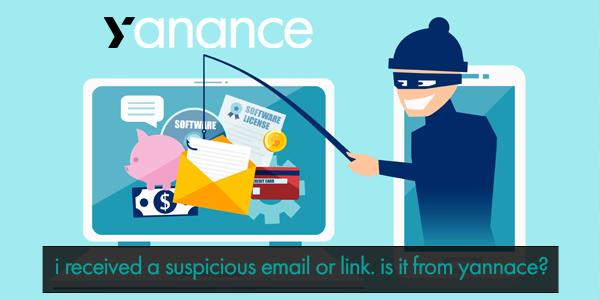
I Received a Suspicious Email or Link. Is it from Yanance?
If you receive a suspicious message or phishing link claiming to be from Yanance, do not click any links or download attachments. These could compromise your device or expose your personal data.
🚨 What You Should Do:
-
Report the message immediately to our Support team.
-
Include all relevant details (screenshots, sender info, message content) to help us investigate.
-
Your report helps protect not only you but the entire Yanance community.
❌ Yanance Will Never Ask For:
-
Your full credit card number or bank details
-
Your Yanance password
-
Your 2FA code
-
To click a link to release funds, verify info, or cancel a trade (you can do this directly on our platform)
If you receive a message requesting any of this information, it's a phishing attempt. Report it immediately.
🔍 How to Spot a Phishing Link:
-
Suspicious URLs (check for odd characters or typos)
-
Links hidden in images or QR codes
-
Messages with .html attachments
-
File-sharing links (often lead to malware)
-
Pictures that contain messaging apps like WhatsApp
🕵️ How to Identify a Phishing Message or Email:
-
Requests for sensitive info (bank details, login credentials, ID numbers)
-
Alarming claims like "your account is compromised"
-
Unsolicited messages asking you to verify account info
-
Misspelled email addresses (e.g., support@yanancee.com)
-
Links that don’t lead to www.yanance.com
-
Emails mimicking our design to trick you
✅ How to Protect Yourself:
-
Always confirm messages are from official Yanance sources:
-
Never click suspicious links, open unexpected attachments, or share personal details via chat or email.
-
Keep your trades within Yanance—avoid off-platform transactions.
For more tips, read our full Security Guide or contact Yanance Support if you're unsure about any message you receive.
Stay alert. Stay safe.
Share This Post
If you receive a suspicious message or phishing link claiming to be from Yanance, do not click any links or download attachments. These could compromise your device or expose your personal data.
🚨 What You Should Do:
-
Report the message immediately to our Support team.
-
Include all relevant details (screenshots, sender info, message content) to help us investigate.
-
Your report helps protect not only you but the entire Yanance community.
❌ Yanance Will Never Ask For:
-
Your full credit card number or bank details
-
Your Yanance password
-
Your 2FA code
-
To click a link to release funds, verify info, or cancel a trade (you can do this directly on our platform)
If you receive a message requesting any of this information, it's a phishing attempt. Report it immediately.
🔍 How to Spot a Phishing Link:
-
Suspicious URLs (check for odd characters or typos)
-
Links hidden in images or QR codes
-
Messages with .html attachments
-
File-sharing links (often lead to malware)
-
Pictures that contain messaging apps like WhatsApp
🕵️ How to Identify a Phishing Message or Email:
-
Requests for sensitive info (bank details, login credentials, ID numbers)
-
Alarming claims like "your account is compromised"
-
Unsolicited messages asking you to verify account info
-
Misspelled email addresses (e.g., support@yanancee.com)
-
Links that don’t lead to www.yanance.com
-
Emails mimicking our design to trick you
✅ How to Protect Yourself:
-
Always confirm messages are from official Yanance sources:
-
Never click suspicious links, open unexpected attachments, or share personal details via chat or email.
-
Keep your trades within Yanance—avoid off-platform transactions.
For more tips, read our full Security Guide or contact Yanance Support if you're unsure about any message you receive.
Stay alert. Stay safe.